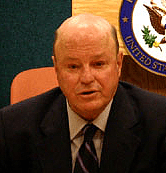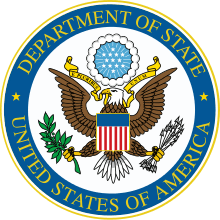Frank G. Wisner
Frank George Wisner II (born July 2, 1938) is an American businessman and former diplomat. He is the son of CIA official Frank Wisner (1909–1965). On January 31, 2011, he was sent to Egypt by President Barack Obama to negotiate a resolution to the popular protests against the regime that have swept the country.[3] A White House spokesman said that Wisner had vast experience in the region as well as close relationships with many Egyptians in and out of government. The New York Times reports that he is a personal friend of Egyptian president Hosni Mubarak.[4] Speaking on the BBC on February 5, 2011, he exceeded statements issued by the White House to date and insisted that President Mubarak should be allowed to remain in office despite widespread calls for him to step down.
He works as an international-affairs advisor at the firm of Squire Patton Boggs in Washington, DC.[5]
Life and career
Wisner was born in New York on July 2, 1938.[2][6] He joined the State Department as a Foreign Service Officer in December 1961.
In 1976, at the beginning of the Carter administration, he served under Cyrus Vance as Deputy Executive Secretary of the Department of State. Among his overseas assignments, Wisner served as the United States Ambassador to Zambia (1979–82); Egypt (1986–91), the Philippines (1991–92), and India, 1994–97.
During his tenure in Lusaka he played the role of point man for the Constructive Engagement policy of assistant secretary of state for African affairs Chester Crocker. Wisner worked well with Zambian president Kenneth Kaunda and helped to rebuild bilateral relations between Zambia and the USA after a 1980 spy scandal at the U.S. embassy in Lusaka. Crocker's efforts contributed to the organization and successful discussions at the February 1984 Lusaka Conference regarding conflicts in Angola and Namibia.[7]
After retiring from government service in 1997, Wisner joined the board at a subsidiary of Enron, the former energy company and served on the board of American International Group (AIG).
In late 2002, Wisner co-chaired an independent working group which developed a model for the US's post-conflict role in Iraq, should an invasion occur. Their published recommendations included: establishment of law and order through the retraining of the Iraqi army, focusing on the distribution of humanitarian assistance and reestablishment of vital services, and the importance of avoiding the appointment of exiled Iraqi opposition leaders to dominant positions in the new government.[8]
Wisner is an advisory board member for the Partnership for a Secure America, a not-for-profit organization dedicated to recreating the bipartisan center in American national security and foreign policy. In 2012 he succeeded Paul A. Volcker as chairman of the board of trustees of International House, a cultural-exchange residence and program center in New York City. He also serves on the advisory board of the National Security Network, and on the board of Refugees International.[9] He went on to become a member of the board for EOG Resources. In June 2013, Wisner joined the advisory board of Ergo, a global intelligence and advisory firm.[10] Weisner is Chair of the Board of the The Arab Gulf States Institute.[11]
2011 Egypt protests
In early 2011, the Obama administration asked Wisner to carry views to Egyptian leader Hosni Mubarak, including advice that Mubarak should resign to defuse the crisis.[12] Wisner was unsuccessful in convincing Mubarak to do so. Four days later, after a day in which Mubarak allies took violent reprisal against democracy activists, Wisner spoke to a security conference in Europe and called it "crucial" that Mubarak stay on in the interest of "stability". The State Department immediately disavowed his comments and said Wisner had not been serving as an envoy but as a conduit for certain administration views.[13]
References
- ↑ "The extended family of Nicolas Sarkozy (de Nagy-Bocsa)". xing.com. Retrieved 26 March 2016.
- 1 2 3 4 "Frank G. Wisner". (Biography) Wharton Global Business Forum. Archived from the original on May 21, 2012.
- ↑ "Egypt protests – Monday 31 January". The Guardian. January 31, 2011.
- ↑ "Obama Urges Mubarak Not to Run Again". New York Times. February 1, 2011.
- ↑ "Frank G. Wisner". Squire Patton Boggs. Retrieved 2 March 2016.
- ↑
- ↑ Andy DeRoche, Kenneth Kaunda, the United States and Southern Africa (London: Bloomsbury, 2016), 150-151, 168-170, and 192-196.
- ↑ "Guiding Principles for U.S. Post-Conflict Policy in Iraq" (PDF). James A. Baker Institute For Public Policy at Rice University.
- ↑ "Press Release". Refugees International. May 9, 2008.
- ↑ "Ambassador Frank G. Wisner Joins Ergo's Advisory Board" (Press release). Ergo via PR Newswire. June 11, 2013. Archived from the original on October 13, 2013. Retrieved June 12, 2013.
- ↑ Weisner, Frank (5 May 2016). "America Still Needs Saudi Arabia". The National Interest. Retrieved 4 July 2016.
- ↑ Stolberg, Sjeryl Gay (February 2, 2011). "Frank Wisner, the Diplomat Sent to Prod Mubarak". The New York Times. Retrieved 2011-05-11.
- ↑ "West Backs Gradual Egyptian Transition". The New York Times. February 5, 2011.
External links
| Wikimedia Commons has media related to Frank G. Wisner. |
- Appearances on C-SPAN
- Obama Egypt Envoy Frank Wisner Says Mubarak Should Stay – video report by Democracy Now!

